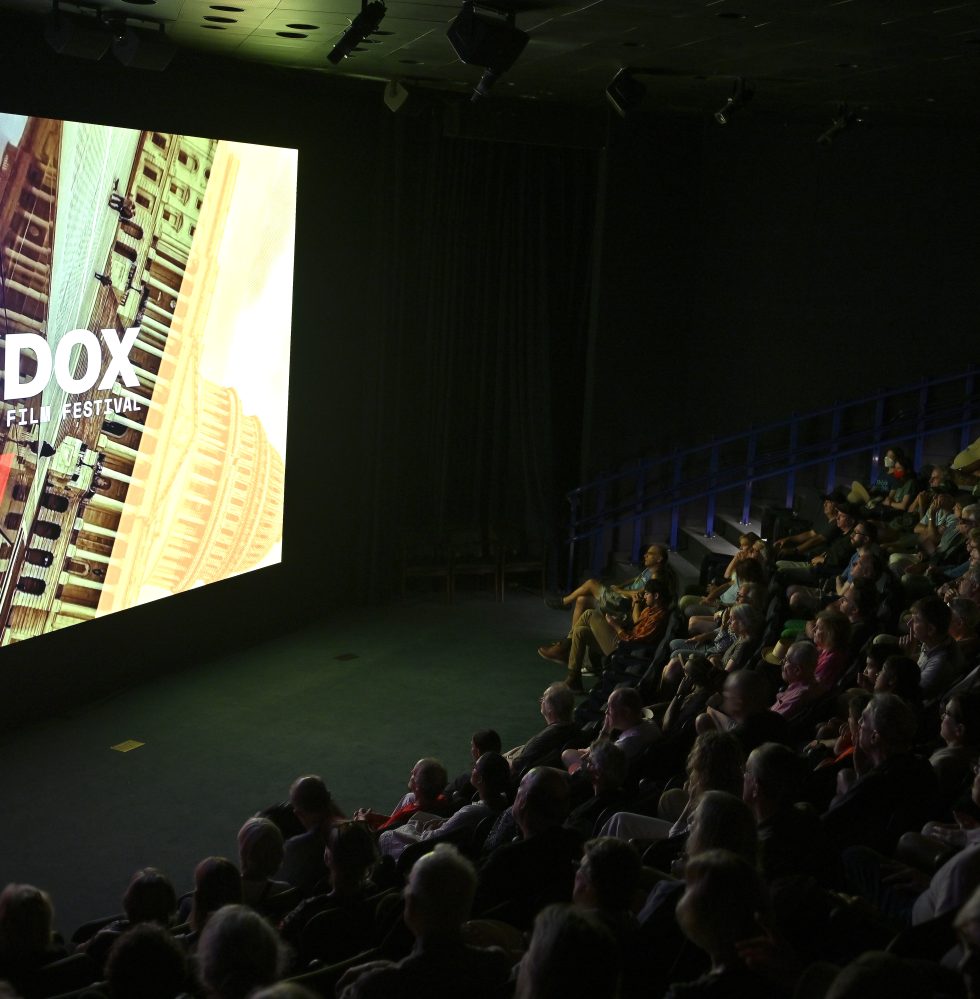
As fate would have it, the third edition of the prestigious DC/DOX festival fell on the same weekend as President Trump’s birthday, and the $45 million military parade he organized in his honor – strike that, in celebration of the 250th anniversary of the U.S. Army.
Anticipating possible disruptions, at least one film booked in the festival cancelled a planned post-screening reception on Saturday – the documentary Barbara Walters: Tell Me Everything (to make up for that, the PR firm representing the film says, “We are in preliminary stages of planning another DC screening in the next week.”). But in the end, the parade attracted limited crowds and the impact on DC/DOX was negligible.

Members of the U.S Army cross Arlington Memorial Bridge to start the parade down Constitution Avenue marking the 250th birthday of the U.S. Army June 14, 2025 in Washington, DC.
Kayla Bartkowski/Getty Images
“I think our community has come out in droves even against some challenges or anticipated challenges that didn’t necessarily come to fruition,” DC/DOX co-founder and festival director Sky Sitney tells Deadline. “I feel really satisfied that so many people continued to show up at these films and show up for the filmmakers despite that, and I think in some ways almost because of it, I think there was a sense of wanting to find each other here in this space.”
“We felt like we knew our audiences and that they would rally around this,” concurs festival cofounder Jamie Shor. “They just embraced it. They said, if we have to walk an extra block because we’re part of this zone where it’s pedestrians only, then they were willing to do that to get to these films. And that was what was so gratifying.”
DC/DOX wrapped Sunday night with a screening of Bodyguard of Lies, the new film directed by two-time Oscar nominee Dan Krauss that asserts “U.S. officials spun a tangled web of deception during its 20-year war in Afghanistan.” Many festivals conclude with an announcement of prizes, but DC/DOX doesn’t hand out awards, by design.

Chuck Todd (left) moderates a Q&A after the DC/DOX screening of ‘In Waves and War’
Courtesy of DC/DOX. Photo by Carolina Kroon
“We really wanted to create an environment where we were not creating this unnecessary competition and hierarchy amongst filmmakers,” Sitney says of the absence of awards. “Really, short of our Signature Screenings — the opening, closing — all the films are part of the same program. And we actually also offer the same resources to our shorts as we do our features. A filmmaker could make a five-minute film or a three-hour film, and we’re bringing them in, we’re putting them up, we’re putting our resources there to not create this unnecessary, again, hierarchy. And I think it’s part of why we’ve become very quickly a beloved festival for filmmakers. I think they feel really respected, and I think they feel like the energy we’re creating here is celebratory.”

Jamie Shor (left) and Sky Sitney on the opening night of DC/DOX
Courtesy of DC/DOX. Photo by Carolina Kroon
Shor says filmmakers hope for a DC/DOX berth for reasons other than a potential award.
“They come to Washington to find very specific resources for their film,” she says. “Whether it’s access to the news media or it’s access to any of the interest groups who are rooted here, who are doing great advocacy work or can elevate their film. They have our general laurels, but not that they need a ‘double special one’ out of this. What they want are the resources that this market provides. We wanted people to come to this market to get those specific resources and not to have some specific accolade. We wanted the audiences to cheer them, not necessarily a jury. That’s not to say that down the road we may come up with something, but right now here in our toddlerhood [as a three-year-old festival], we’re committed to providing this for the filmmakers in an egalitarian way.”
The emergence of DC/DOX maintains the nation’s capital and surrounding area as an important destination for nonfiction film lovers after AFI Docs (previously known as Silverdocs) ended a 20-year run when it was folded into AFI Fest, the LA-based festival. DC/DOX is a relatively short event as festivals go – just four days. But again, that’s the way the cofounders prefer it.
“When people think about the future of a festival, the easy thing to think about is expansion. And I’m an anti-expansionist because I truly think that people confuse getting bigger for getting better and smarter,” observes Sitney. “Even if we added days or added more films, I am absolutely not convinced that that will make the festival better. I actually think that the size we are right now allows us to offer more than anyone can take advantage of, which is always good… There’s intimacy here and I think a kind of clear curatorial vision. And I think we’re quite frankly, the exact right size.”
Shor says the four-day run allows people in the community to participate in the festival. DC/DOX in that sense is different from festivals like Sundance or, say, Cannes, where the great bulk of attendees come from way outside the local area.
“We still serve the community that we serve. And so if we’re going to say that we prioritize you Washingtonians or Virginians or Marylanders as our audience, we have to meet them where they are. And they’re in their office on Thursday morning, so we need to make it easy for them to access our films. We pack ’em in on the weekend and on Friday, but this is where we are,” Shor comments (a full day of programming on Friday works at this time of year when many in DC get a “summer Friday” day off).
The 2025 edition of DC/DOX drew many prominent filmmakers including Emmy nominee Ryan White (Come See Me in the Good Light); Oscar nominee Rachel Grady (Folktales, co-directed with Heidi Ewing); Coexistence, My Ass! director Amber Fares and the protagonist of her film, Israeli comedian Noam Shuster-Eliassi; Oscar nominee Kahane Corn Cooperman (Creede U.S.A.); two-time Oscar nominee Jay Rosenblatt (Heartbeat); Oscar nominees Carl Deal and Tia Lesson (Steal This Story, Please!); Emmy winner and Oscar nominee Andrew Jarecki (The Alabama Solution, co-directed with Charlotte Kaufman); The Perfect Neighbor director Geeta Gandbhir, winner of the U.S. documentary directing prize at Sundance; Seeds director Brittany Shyne, winner of the Grand Jury Prize for U.S. documentary at Sundance; Holding Liat director Brandon Kramer, winner of the top prize for documentary at the Berlin Film Festival; David Osit (Predators); director Elegance Bratton and producer Chester Algernal Gordon (Move Ya Body: The Birth of House); Kartemquin Films cofounder Gordon Quinn, and many more.

U.S. Supreme Court Justice Ketanji Brown Jackson with her daughter, Leila, attending the ‘Speak.’ screening at DC/DOX film festival on Friday. L-R Executive Producer Lisa Hepner, film
participant Esther Oyetunji, Justice Ketanji Brown Jackson, Leila Jackson, film participant
Mfaz Mohamed Ali, co–director Guy Mossman and Jack Mossman.
Courtesy of DC/DOX. Photo by Joe Goldberg
One very special guest of the festival — U.S. Supreme Court Justice Ketanji Brown Jackson, who attended the screening of Speak., a documentary directed by Jennifer Tiexiera and Guy Mossman about five teenagers competing for top awards at the National Speech and Debate Association Championships. The future justice competed in the NSDA as a high schooler in 1988.
In addition to filmmakers — and the Supreme Court Justice — prominent figures in journalism and academia served as moderators of panel discussions and post-screening Q&As, including American University scholar and author Patricia Aufderheide; Washington Post film critic Ann Hornaday; Washington Post national enterprise reporter Robert Samuels; David Martin, CBS News national security correspondent; Chuck Todd, former host of NBC’s Meet The Press; and The Atlantic’s Hanna Rosin.
A number of films in the program have gained distribution, including Sally (National Geographic Documentary Films); Come See Me in the Good Light (Apple TV+); The Perfect Neighbor (Netflix), and Folktales (Magnolia Pictures).
In the current acquisition-challenged state of the doc field, many of the films don’t have distribution yet; for them, a platform like DC/DOX becomes even more critical. “I do think we are experiencing, I think, a return to the value of festivals, not just the top 10, but some of the regional festivals. I consider ourselves a heightened regional festival,” Sitney tells Deadline. “I think the filmmakers are now really valuing the place that we have in filling that void for the absence of distribution.”



